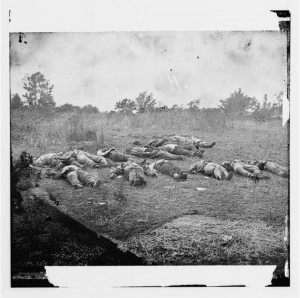In 1997, I was living in exile–a Southern girl in Sioux City, Iowa –when the famed documentary film maker Ken Burns arrived in town with his colleague Duncan Dayton to launch Ken’s new film The Corps of Discovery: The Journey of Lewis and Clark. The intrepid explorers had come through town on the Missouri River on their way to meeting Sacajawea somewhere out west. At a book signing after the screening, I told Ken how much his Civil War films had meant to me, and that my novel for young readers about the Civil War in South Carolina had just been published. He jumped to his feet, shook my hand and thanked me for writing such a story.
I remembered that moment a couple of weeks ago when I learned that Ken’s brother, Ric Burns had just completed a documentary about death and the Civil War. The gist of the film is that the massive deaths experienced on both sides changed forever the American perception of death and the customs surrounding it. One of those quoted in the film, a man who is both a poet and an undertaker, spoke about the necessity of controlling a funeral as a way of dealing with loss. The choosing of a time and place of burial, the selection of hymns and readings, even the rituals associated with food ( in the South when someone dies we bake pies) are a necessity for the living. When the war came, all of that was stripped away.
The concept of the good death in which one is surrounded by family in the final moments before stepping into eternity was wiped out on the battlefields and in the hospitals and prison camps. The letters of wounded soldiers who knew death was near, the anguished pleas of women desperate for news of husbands, brothers and fathers cited in the film brought the war vividly to life again. I was reminded once more of why I love writing historical fiction. It’s a chance to give voice to those who have gone before, to peer into another place and time to experience both its horror and its beauty.
Every time I see a Mathew Brady photo like this one— taken on the battlefield at Gettysburg—I can’t help wondering about who these men were. Where did they belong? What were their dreams? Did their mothers and brothers, sweethearts, sisters and fathers ever learn what happened to them? I can’t help wondering whether any of them were my ancestors.
If you missed the film last week, I hope you get another chance to see it. It brings one more facet of the war home to us in a new and dramatic way. I wish I had the chance to shake Ric Burns’ hand and thank him for making it.

We keep good track of people these days. Websites know us by address and phone numbers. The IRS knows when we last paid taxes. So it seems difficult to imagine a world where people did disappear. Branches on my family tree read “left Scotland for Canada and never heard from again.” What heartache those words represent. Like the families of Civil War soldiers, not knowing must have incredibly painful. Maybe that’s why I write historical fiction – for the happy endings.
Good points, Cathy. It is sad, those “never heard of again.” Yes, in fiction, we cna always make the world come right…:) Thanks for stopping by A Southern Journal.